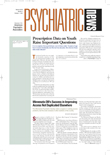A few years ago, it was all the rage to blame ulcers of the stomach or duodenum on stress or anxiety. Then the bacterium Helicobacter pylori was fingered as a cause for these peptic ulcers, and a psychological explanation for them fell into disrepute.
However, while nearly all peptic ulcer patients have H. pylori, only a small number of people with the bacterium get peptic ulcers, suggesting that some other factor, maybe psychological, might be necessary for H. pylori to cause ulcers. A new study suggests that this other factor might be chronic anxiety. The study has found not only a statistically significant link between chronic anxiety and peptic ulcers in a large population sample, but a connection between the amount of worrying people do and their risk of peptic ulcers.
The study was conducted by Renee Goodwin, Ph.D., an assistant professor of epidemiology at Columbia University, and Murray Stein, M.D., a professor of psychiatry at the University of California at San Diego. The study was reported in the November/December Psychosomatic Medicine.
From 1990 to 1992 a large, nationally representative survey called the National Comorbidity Survey was undertaken. It was based on a sample of some 8,000 people 15 to 24 years of age. The 8,000 individuals reported whether they were experiencing one or more mental disorders, including generalized anxiety disorder, or whether they were experiencing one or more physical health problems, including a peptic ulcer. Goodwin and Stein decided to use data from this survey to explore a possible relationship between generalized anxiety disorder and peptic ulcer disease.
After taking sociodemographic differences and comorbid mental disorders into consideration, the researchers found a statistically significant link between the presence of generalized anxiety disorder and the presence of a peptic ulcer. Persons with generalized anxiety disorder had a 2.2 greater chance of having a peptic ulcer than persons without the disorder.
The investigators also found a dose-response relationship between generalized anxiety disorder and peptic ulcer disease—in other words, with each anxiety symptom reported, the individual had a 20 percent greater chance of having an ulcer. The anxiety symptoms included restlessness, being irritable, being tense, being keyed up, trembling, or having trouble concentrating.
Moreover, the researchers attempted to see whether having a specific physical health problem—say, asthma, arthritis, diabetes, high blood pressure, or kidney disease—increased the likelihood of having generalized anxiety disorder. After taking sociodemographic characteristics into consideration, they found that the only physical health problem that increased the likelihood was a peptic ulcer.
If chronic worrying does help precipitate peptic ulcers, how does it do it? It might shift immune reactions to H. pylori, the researchers proposed. And if chronic worrying helps trigger peptic ulcers, treatment for anxiety, such as antidepressants, might help counter peptic ulcers. Antidepressants have led to improvement among patients with other types of gastrointestinal problems, such as irritable bowel syndrome (Psychiatric News, July 20, 2001). In fact, as the researchers suggested in their study report, peptic ulcers might be effectively treated by combining antidepressants with H. pylori medications.
Psychiatric News asked Goodwin whether she and Stein will be conducting any more studies on anxiety and peptic ulcers. She replied: “We would like to investigate the relationship between generalized anxiety disorder and ulcers using prospective, longitudinal, epidemiologic data, including data on physiologic measures of ulcer.” She and Stein might also look “at whether treatment of generalized anxiety disorder is associated with improvement in ulcer outcome.”
The study by Goodwin and Stein also raises the intriguing possibility that chronic anxiety may not be the only psychological state capable of triggering a peptic ulcer. After adjusting for demographic differences and current psychiatric comorbidity, the researchers found a statistically significant link between not just generalized anxiety disorder and peptic ulcer, but between specific phobia and peptic ulcer, and between bipolar disorder and peptic ulcer.
“It could be that generalized anxiety disorder, phobia, and bipolar disorder share some common underlying feature that links each of them with ulcer,” Goodwin told Psychiatric News, “or there may be separate mechanisms for each of these associations.”
An abstract of the study, “Generalized Anxiety Disorder and Peptic Ulcer Disease Among Adults in the United States,” is posted on the Web at www.psychosomaticmedicine.org/cgi/content/abstract/64/6/862. ▪
Psychosom Med 2002 64 862
